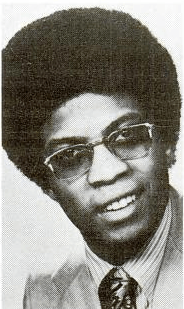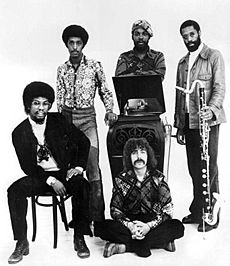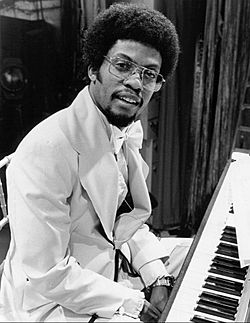Herbie Hancock facts for kids
Quick facts for kids Herbie Hancock |
|
|---|---|
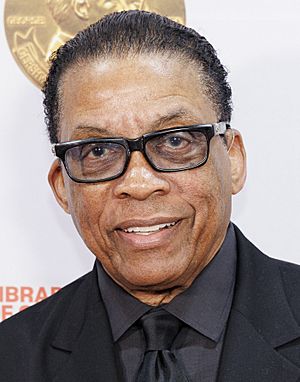
Hancock in 2023
|
|
| Background information | |
| Birth name | Herbert Jeffrey Hancock |
| Born | April 12, 1940 Chicago, Illinois, U.S. |
| Education | Grinnell College Roosevelt University Manhattan School of Music |
| Genres |
|
| Occupation(s) |
|
| Instruments |
|
| Years active | 1961–present |
| Labels | |
Herbert "Herbie" Jeffrey Hancock (born April 12, 1940) is a famous American jazz musician, bandleader, and composer. He is known for playing the piano and other keyboard instruments. Hancock began his career playing with the trumpeter Donald Byrd. He later joined the famous Miles Davis Quintet. There, he helped change the sound of the jazz rhythm section (the part of the band that keeps the beat, usually piano, bass, and drums).
In the 1970s, Hancock experimented with many styles of music. He mixed jazz with funk and electro music. He used new instruments like synthesizers to create unique sounds. During this time, he released one of his most famous albums, Head Hunters.
Hancock has written many songs that are now considered jazz standards, which means they are played by jazz musicians all over the world. Some of his most famous songs are "Cantaloupe Island", "Watermelon Man", and "Chameleon". In the 1980s, he had a huge hit with the song "Rockit".
He has won many awards, including an Academy Award and 14 Grammy Awards. In 2007, his album River: The Joni Letters won the Grammy for Album of the Year. Since 2012, he has been a professor at the University of California, Los Angeles (UCLA).
Contents
Early Life and First Steps in Music
Herbie Hancock was born in Chicago, Illinois. He started playing the piano when he was only seven years old. He was so talented that people called him a child prodigy, which is a child with amazing abilities. At age 11, he performed a piano piece by Mozart with the Chicago Symphony Orchestra.
As a teenager, Hancock taught himself jazz by listening to records. He listened to great jazz pianists like Bill Evans and Oscar Peterson. He also learned a lot about harmony from the music of Clare Fischer, who arranged music for a vocal group called the Hi-Lo's.
In 1960, Hancock moved from Chicago to New York City. He began working with famous musicians like Donald Byrd and Coleman Hawkins. He recorded his first album as a leader, Takin' Off, in 1962. This album included his song "Watermelon Man", which became a big hit. The album got the attention of the legendary trumpeter Miles Davis.
Career Highlights
The Famous Miles Davis Quintet
In 1963, Herbie Hancock joined the Second Great Quintet, one of the most important groups in jazz history. The band included Hancock on piano, Ron Carter on bass, Tony Williams on drums, and Wayne Shorter on saxophone. Together, they created a new style of jazz called post-bop.
While in Davis's band, Hancock also recorded his own albums for Blue Note Records. These albums, like Maiden Voyage and Speak Like a Child, are now considered classics. During this time, Davis encouraged Hancock to play electric keyboards, like the Fender Rhodes electric piano. This opened up a new world of sounds for Hancock.
Exploring New Sounds in the 1970s
In the early 1970s, Hancock formed a new band and began to experiment with electronic music. This period is often called his "Mwandishi" era, named after a Swahili name he used. The music was very experimental and combined jazz with electronic sounds from synthesizers.
The Headhunters and Jazz-Funk
In 1973, Hancock created a new band called The Headhunters. Their first album, Head Hunters, was a massive success. It blended jazz with funk music, creating a style known as jazz-funk. The album was popular with both jazz and pop audiences. It included the famous track "Chameleon".
The Headhunters released more successful albums, like Thrust. Hancock continued to make popular jazz-funk albums throughout the 1970s, including Man-Child and Secrets.
The "Rockit" Revolution in the 1980s
In 1983, Hancock released the song "Rockit" from his album Future Shock. This song was groundbreaking. It was one of the first mainstream hits to feature scratching, a technique used by hip-hop DJs.
The music video for "Rockit" was also very popular. It featured dancing robots and was a big hit on MTV. The song won a Grammy Award and became an anthem for breakdancers. It showed how Hancock was always willing to try new things and mix different styles of music.
During the 1980s, Hancock also wrote music for movies. He won an Academy Award for the soundtrack of the film 'Round Midnight.
Later Career: Tributes and New Projects
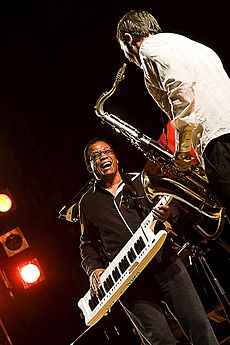
In the 1990s, Hancock continued to explore different kinds of music. He recorded A Tribute to Miles in 1994 to honor his friend and former bandleader, Miles Davis. In 1998, he released Gershwin's World, an album of songs by the composer George Gershwin, which featured many famous guest artists.
In 2007, Hancock released River: The Joni Letters, a tribute to the singer-songwriter Joni Mitchell. The album was a huge success and won the Grammy Award for Album of the Year in 2008. This was a rare achievement for a jazz album.
In 2010, he released The Imagine Project, which featured collaborations with artists from all over the world. Hancock continues to tour, record, and teach music.
Personal Life
Hancock married his wife, Gigi, in 1968. They have one daughter. He has been practicing Nichiren Buddhism since 1972. He says that chanting every day is an important part of his life.
In 1963, when he was 23, Hancock bought a special sports car, a 1963 AC Shelby Cobra. He paid $6,000 for it. He still owns the car today, making him the longest-running original owner of a Cobra. The car is now very rare and is worth over $2 million.
Discography
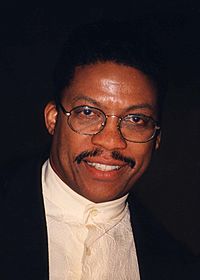
Studio albums
- Takin' Off (1962)
- My Point of View (1963)
- Inventions & Dimensions (1964)
- Empyrean Isles (1964)
- Maiden Voyage (1965)
- Speak Like a Child (1968)
- The Prisoner (1969)
- Fat Albert Rotunda (1969)
- Mwandishi (1971)
- Crossings (1972)
- Sextant (1973)
- Head Hunters (1973)
- Dedication (1974)
- Thrust (1974)
- Man-Child (1975)
- Secrets (1976)
- Third Plane (1977)
- Herbie Hancock Trio (1977)
- Sunlight (1978)
- Directstep (1979)
- The Piano (1979)
- Feets, Don't Fail Me Now (1979)
- Monster (1980)
- Mr. Hands (1980)
- Magic Windows (1981)
- Herbie Hancock Trio (1982)
- Quartet (1982)
- Lite Me Up (1982)
- Future Shock (1983)
- Sound-System (1984)
- Village Life (1985)
- Perfect Machine (1988)
- A Tribute to Miles (1994)
- Dis Is da Drum (1994)
- The New Standard (1996)
- 1+1 (1997)
- Gershwin's World (1998)
- Future 2 Future (2001)
- Possibilities (2005)
- River: The Joni Letters (2007)
- The Imagine Project (2010)
Filmography
| Year | Title | Role | Notes |
|---|---|---|---|
| 1981 | Concrete Cowboys | Gideon | Episode: "The Wind Bags" |
| 1985 | The New Mike Hammer | Himself | Episode: "Firestorm" |
| 1986 | Round Midnight | Eddie Wayne | Also producer of the original motion pictures soundtrack |
| 1988 | Branford Marsalis Steep | Himself | |
| 1993 | ... Proposal | Himself | |
| 1995 | Invisible Universe | Poetry reader (voice) | Video game |
| 2002 | Hitters | District Attorney | |
| 2014 | Girl Meets World | Catfish Willie Slim | Episode: "Girl Meets Brother" |
| 2015 | Miles Ahead | Himself | |
| 2016 | River of Gold | Narrator | Documentary |
| 2017 | Valerian and the City of a Thousand Planets | Defense Minister |
Images for kids
See also
 In Spanish: Herbie Hancock para niños
In Spanish: Herbie Hancock para niños
 | James Van Der Zee |
 | Alma Thomas |
 | Ellis Wilson |
 | Margaret Taylor-Burroughs |


